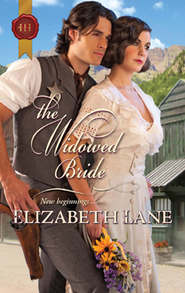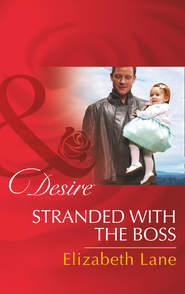По всем вопросам обращайтесь на: info@litportal.ru
(©) 2003-2025.
✖
Navajo Sunrise
Настройки чтения
Размер шрифта
Высота строк
Поля
The all-too-familiar knot in Miranda’s stomach tightened as she saw him pushing his mount through the swarm of men and animals. As a child she had always been a little afraid of her father. He was so large and forceful, always looming above her like the giant in “Jack and the Beanstalk.” Not once in her memory had he ever bent down to her eye level or lifted her up to his. He had been—and was—a tower of authority, gruff and unbending. Maybe that was part of the reason Miranda’s gentle mother had remained in the East, refusing to follow him to his remote postings as many officers’ wives did.
Someone had lit a torch. In its blazing yellow light she saw him looming above her once more—older now, by nearly four years, than when she’d last set eyes on him. The leathery creases around his eyes had deepened and the bristling sideburns that failed to hide his outsize ears were streaked with gray. But his penetrating granite eyes were exactly as Miranda remembered them.
Now those eyes were staring down at the man Miranda held in her arms—a man he undoubtedly knew and probably hated.
“What in blazes is going on here, Miranda?” he growled without so much as a nod of greeting. “What are you doing with this Indian?”
“He’s hurt.” Miranda forced herself to meet her father’s angry gaze. “If we’d left him by the road with a storm blowing in, he could have died of exposure.”
“Not the worst thing that could happen, by a long shot!” Iron Bill snapped. “If you ask me, the whole damned reservation, even the Navajos, would be better off without the troublemaking bastard!” Before Miranda could respond, he turned abruptly to the sergeant. “What happened, soldier? And who allowed my daughter to get involved with this vermin?”
The sergeant’s Adam’s apple quivered as he swallowed and spoke. “Ahkeah, here, insulted your daughter and refused to apologize, sir. Things were getting out of hand, and—”
“And just as your men were about to shoot him, someone crashed a rifle butt into his head!” Miranda interrupted. “The entire episode was completely uncalled-for, Father. If your soldiers had left well enough alone, Ahkeah would simply have ridden away without—”
“I can speak for myself.” The Navajo’s sharp voice sliced into the flow of her own words. Startled, Miranda glanced down into the jet-black pits of Ahkeah’s eyes.
“The sergeant was right,” he said, twisting away from her and pushing himself, with effort, to a sitting position in the wagon bed. “I did insult your daughter. She was meddling where she had no business. I told her as much, and when I was ordered a second time, I did refuse to apologize. Now, since the matter of blame is settled, I’ll be taking my leave.”
Miranda watched the pain ripple across his face as he flung the cloak aside and staggered to his feet, then turned to catch the reins of his horse, which had been tied to the back of the buckboard. A vehement protest sprang to her lips. The man was in no condition to ride. If he passed out again he could lie unconscious all night, exposed to the coming storm. But one glance at his stubbornly set face confirmed that arguing would do no good. Not with a man like Ahkeah.
Grimacing with effort, he brought the rack-ribbed animal alongside the wagon. No one made a move, either to assist him or to hinder him, as he eased one leg over its back and slid awkwardly into place. The wind whipped his raven hair as he swung away from the wagon and turned, for the space of a heartbeat, to lock his gaze with Miranda’s. His contemptuous eyes ignited sparks of black fire through a glaze of pain. Then, as lightning forked across the sky with an earsplitting crack, he wheeled his mount and galloped into the darkness.
The silence that hung over the small company lasted for the space of a long breath. Then another bolt of lightning ripped the gathering clouds, and the full fury of the storm burst out of the sky. Lashing sleet, driven almost sideways by the wind, pelted them like buckshot. Mules brayed. A horse screamed and reared. Galvanized to action, the cavalry and wagon formed a column and headed like an arrow for Fort Sumner.
Teeth chattering, Miranda gathered her dusty cloak from the wagon bed, flung its sheltering warmth around her head and shoulders and clambered onto the jouncing seat beside the driver. The thick, soft wool still carried the pungent wood smoke scent of Ahkeah’s body. As she closed her eyes against the stinging sleet, the aroma stole into her senses, evoking the memory of his obsidian eyes piercing her defenses, his sharp-boned features molding the shape of her breast.
She pictured him now, galloping his half-starved mount through the icy storm, his water-soaked clothes freezing to his skin. She imagined the horse stumbling, startled, perhaps, by a fleeing animal or a sudden clap of thunder. She saw the reins slip from the frozen bronze fingers…
Stop it! Miranda admonished herself. You can’t allow yourself to fret over the man! You’re not responsible for what happens to him! And yet she knew in her heart she was responsible. If she had not stopped to help a pathetic old woman, none of this ongoing debacle would have taken place. If Ahkeah came to further harm tonight, the blame would be squarely on her own shoulders. That awareness weighed on her, darkening her thoughts as the buckboard and its escort thundered through the flying sleet toward the shelter of the fort.
Miranda awoke the next morning to the cold, gray silence of the spare room in her father’s quarters. For a long moment she lay quietly beneath the flannel sheet and thick woolen army blankets, watching the play of light beams through a crack in the shuttered window. Her gaze wandered to the rough-timbered ceiling and down the plain adobe walls, bare, even, of whitewash. She inspected the peeling wardrobe, standing askew as if it had been hauled in from some dusty storage room for the purpose of her visit.
As her mind roused to full wakefulness, she remembered last night’s arrival—the flaring torchlight, the steaming breath of the mules as she dismounted stiffly from the buckboard. She remembered the strained, hasty supper of cold beans and bread in the officers’ mess, and her father’s brusque silence, which she’d tried to fill with chatter about her long trip. She’d wanted to ask him about Ahkeah, but had decided against it. Things were too unsettled between the two of them, too raw and confusing. Oh, why had she come here? Why had she placed so much importance on making peace with the man who’d fathered her, when it would have been so much easier to simply let go? Why had she allowed Iron Bill Howell to matter so much to her, when she clearly mattered so little to him?
As she turned onto her side, she saw her leather trunk, standing open as she’d left it last night after rummaging for a clean nightgown. She had fallen into bed, too tired even to brush her hair or wash her face. Now she felt rumpled and gritty-eyed, her hair damp and coarse with alkali dust. What she wouldn’t give for a bath! But this was no time for self-indulgence. It was time to get up, pull herself together and face whatever the day might bring.
Tossing back the covers, Miranda swung her legs out of bed. Her serge traveling suit lay damp, dirty and hopelessly rumpled where she’d spread it on the single wooden chair last night. She took a moment to smooth out the worst of the wrinkles and rearrange the folds. Then she selected another gown from the chest, a simple, dark brown twill, its severity softened by a white lace collar. Hastily she dressed, then splashed her face at the washstand and twisted up her hair.
The silence from the other two rooms told her, even before she opened the door, that her father had already risen and left. His bedroom stood open, the simple bunk made up with military precision. There was no fire in the potbellied stove, and the rudimentary cooking facilities looked as if they had never been used. A quick inspection of the cupboard revealed nothing but a few dishes and not so much as a crumb of food. Clearly Iron Bill took his meals in the mess hall and expected his daughter to do the same—if indeed he’d given any thought to the matter.
Miranda’s blue cloak hung neatly on a rack beside the door. As she lifted it down, she saw that it had been brushed free of dust; but even now the faint aroma of wood smoke clung to it, whispering of Ahkeah. The scent enfolded her as she slipped the cloak over her shoulders, worked a single button through its satin-bound hole and opened the door.
The morning breeze was chilly, but not really cold. Once the sun was high, she realized, the cloak would be too warm. Stepping back into the room, she replaced it on the hook and selected a cashmere shawl—another of Phillip’s gifts—from her trunk. With the shawl’s airy warmth wrapped around her shoulders, she stepped outside and closed the door behind her.
Miranda had glimpsed the lay of the fort last night in the darkness. Now the vista of open desert and low-slung adobe buildings spread before her, not enclosed by walls, as she might have expected a fort to be, but sprawling over acres of barren land, unconstrained by factors of space and safety. Clearly the small military unit that remained here to keep order and protect the Indian Agency had little to fear from their captives or from outside attack. Her eyes picked out what she guessed to be barracks, stables and offices, and one large building that resembled a warehouse—some kind of commissary, she surmised. The ground was still glazed with a thin coating of sleet. Bare earth steamed and glittered in the morning sunlight. There was little or no grass, and the few trees she could see were stunted and bare. How did her father stand this desolate place?
Lifting her skirts above the frozen mud, Miranda strode across the empty square of land that passed for a parade ground toward what she remembered to be the mess hall. The few soldiers who were loitering outside the door straightened to a semblance of attention, tipping their hats as she passed. One of them, a quiet young man who’d been part of her escort from Santa Fe, smiled shyly and held open the door. With a nod of thanks she stepped over the threshold.
Her heart sank as she surveyed the long mess hall with its sea of empty tables and benches and the more genteel officers’ section at the far end. Where was her father? Couldn’t he at least have waited for her to join him for breakfast? Did he think she’d traveled all this distance to wander around this desolate place alone?
“So here you are, my dear.”
Startled by the sound of a feminine voice, Miranda turned to see a plump, birdlike woman hurrying toward her from the direction of the kitchen. She was well into middle age, her badly dyed brown hair sculpted into rigidly upswept curls. Her wine-colored gown was elaborately ruffled at the neck, sleeves and hem, giving her the look of a drooping garden peony.
At closer range Miranda saw that the woman’s childlike face was webbed with lines, but traces of faded beauty lingered in her molasses-brown eyes. Those eyes sparkled as she seized Miranda’s fingers in her small, lace-mitted hand. “Your father had pressing duties this morning and couldn’t be here. I offered to wait and show you around—after you’ve had breakfast, of course. My name is Violet Marsden. My husband is quartermaster here at the fort, and I…” She caught her breath, as if the very effort of speaking had strained her. “I can’t tell you how very pleased I am to welcome you here!”
Still a bit dazed, Miranda allowed the woman to lead her to a table in a corner of the deserted officers’ mess. It was cheerlessly set with a threadbare linen cloth, chipped but serviceable white porcelain and heavy silver plate that bore a patina of long use. But someone had placed a sprig of tiny yellow spring wildflowers in a spare cup. Who had it been? Her father? This woman, perhaps?
“I’ve just been to the kitchen to make sure the cook saved you some porridge.” Violet Marsden settled herself across the table, adjusting her gown like a preening sparrow. An undertone in her fragile voice spoke of cotton fields and magnolias and the gracious manners of a time forever gone. What was she doing here in this barren place that seemed to have had every trace of gentility parched, burned, starved and frozen out of it?
“Did you have a difficult journey?” she asked, lifting the china teapot and pouring a cup for Miranda, then one for herself. There was no sugar or cream on the table, but the tea was fresh, its warmth curling pleasantly in Miranda’s stomach.
“The trip wasn’t bad,” she replied, dismissing what she remembered of last night’s arrival. “But I do have a question. Am I just imagining things, or is my father avoiding me?”
“Avoiding you?” Violet glanced up, her eyes wide with surprise. “How on earth could you imagine such a thing? Of course Major Howell isn’t avoiding you!”
“Then where is he? We’ve barely exchanged a dozen words since I arrived last night!”
“But, my dear, there’s a perfectly logical explanation for that,” Violet protested. “Last night you were exhausted and needed your rest.”
“And this morning?”
“Why, it’s simply the usual Saturday. He needed to be at the issue house early to make certain there’s no trouble with the Navajos!”
“Trouble with the Navajos?” Miranda asked, dimly aware that she sounded like a trained parrot.
“Why, bless you, this is the day they come in to get their rations. Thousands of them! The line goes all the way from the issue house to the road and beyond. With so many Indians about the place, a strong military presence is needed.”
Miranda glanced down at the bowl of gluey oatmeal laced with canned milk that had appeared on the table before her. “And my father couldn’t be spared for a single morning?” she asked, stirring the grayish mess with her spoon.
“The commanding officer of the fort is required to be in attendance.” Violet dabbed at her little rouged mouth with her napkin. “With the care of the Navajos passing from the army to the Bureau of Indian Affairs, this fort has come under a good deal of public scrutiny, my dear. If there’s trouble and some impulsive young soldier fires at unarmed Indians, it could make the army look very bad. Do you understand?”
“I do.” Miranda remembered the rifle butt crunching into Ahkeah’s skull. Evidently it was all right to hit Navajos but not to shoot them.
“It’s the major’s responsibility to make sure nothing happens that would open the army to criticism,” Violet said, brushing away an imaginary crumb from the lace edging on her bodice. “That’s why your father couldn’t delegate the job to anyone else, not even to be with you.”
“I see.” Miranda forced herself to eat, knowing she would be hungry later. Questions about the Navajos—and the disturbing man she had held in her arms last night—milled in her mind, clamoring for answers, but she cautioned herself to hold her tongue. The last thing she wanted was to trigger unpleasant gossip by showing too much interest in a man she had no business knowing.
“Will I be allowed to go to the issue house and watch?” she asked casually.
“I suppose so.” Violet’s patrician nose crinkled with distaste. “But don’t expect to like what you see. The Navajos are a filthy, treacherous lot, far worse than the slaves on my daddy’s plantation ever were. Their young girls hang around the fort and offer themselves to the soldiers for a few crusts of bread! Some of our boys have caught the most dreadful diseases from them! A gentlewoman isn’t supposed to know about such things, but one can’t help hearing talk!”
She frowned, then brightened as her eyes fell on Miranda’s empty teacup. “Would you like me to read your fortune, dear? My old mammy back in Louisiana taught me how, and I’m really quite good at it! I read for all the officers’ wives before they left.”
“Then, by all means, go ahead.” Miranda set little store by fortune-telling, but she had no wish to be rude. She watched skeptically as the small woman took the cup and stared intently into it, studying the pattern of the tea leaves in the bottom.
“Please don’t tell me I’m going to fall in love with a tall, dark stranger,” Miranda said, striving to keep things in the spirit of fun. “I’m getting married in June, and my fiancé is neither dark nor particularly—”











